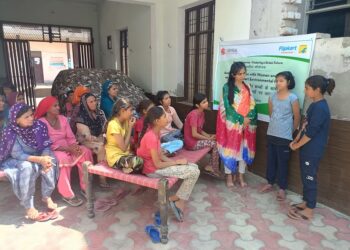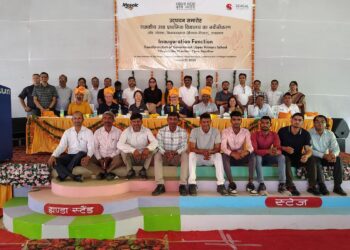NEW DELHI: Home Credit India, an Indian arm of the international consumer finance provider with operations spanning across Europe and Asia and committed to driving financial inclusion, in partnership with SEWA Bharat has launched a livelihood project for nano entrepreneurs. Nano entrepreneurs refer to individuals who start their venture with very less capital. In line with Home Credit’s bandwagon to drive Financial Inclusion and Financial, Digital Literacy in the country and enable entrepreneurship, the project aims to help the nano-entrepreneurs who are unable to resume work due to loss of capital.
The project is in line with government’s agenda of Atmanirbhar Bharat and Vocal for Local aims to equip and empower over 500 artisans from Bihar, West Bengal, Delhi, Punjab, and Uttarakhand. These nano entrepreneurs come from marginalized backgrounds and work as artisans, rural weavers, shoemakers; Papad makers, lac product makers, Tie and Dye producers, garment and embellishment manufacturers, necklaces, rakhis, food products.
Throughout the activity these women will be reskilled and trained to reach the markets or acquire the means and ways of selling which will largely be digital. Pandemic has changed the product consumption patterns and the styles. These entrepreneurs will now have to learn new designs, patterns in weaving for revival of their livelihoods. We would be providing them with raw materials along with guidance on product development through virtual training sessions. This would help them to develop an entire new range of products which would be sold later in the mainstream market and help them earn money.
Commenting on the partnership with SEWA Bharat, Nidhi Malik, Vice President, CSR and Communications, Home Credit India said, ‘Responsible lending is the cornerstone of our business at Home Credit. Over the years we have been actively imparting Financial and Digital literacy to educate our customers and society on the basics of Financial management, budgeting, investing, saving money etc. With this partnership our endeavor is to widen financial outreach and create opportunities to make more and more individuals ‘Self-Reliant. ’The pandemic has led to loss of capital for a majority of nano entrepreneurs and disabled them to start afresh. Our partnership with Sewa Bharat on this mission is to enable these artisans to restore their livelihoods and more importantly the confidence. Through this humble initiative we aim to impart the desired digital and financial skills to make these 500 nano entrepreneurs bounce back and become self-reliant.
Sanchita Mitra, National Coordinator, SEWA Bharat, said, “The COVID-19 lockdown has negatively affected the livelihoods of many mostly invisible poor people. SEWA works in many States namely Bengal, Bihar, Delhi, Gujarat, Kerala, Madhya Pradesh, Nagaland, Orissa, Punjab, Rajasthan, Uttarakhand, and Uttar Pradesh. Within the SEWA membership, large numbers of informal sector workers are part of the global supply chain either as nano entrepreneurs or linked with local informal contractors or middlemen for work. For the home-based artisans and weavers, the model of middlemen which gave them business, disintegrated. In some cases, middlemen completely disappeared, leaving artisans and weavers without any leads to the market. They continue to look for market and arrangement for raw material. They are also adapting to the digital world to enhance skill, access to finance and government schemes”.
She further added, “We are incredibly happy to announce that SEWA Bharat has partnered with Home Credit to support 500 artisans & weavers with raw materials and product development at a time of extreme need. This association would also help in building up their capacity to deal with this newly adopted virtual marketing space. We stand grateful to Home Credit and hope to make a long-term impact on the lives of these women and their families, together. We look forward to more and more meaningful work in the future.”
As per the industry figures 94% of India’s female labor force, informal economy women workers continue to struggle for protection. With this initiative HCIN’s vision is to impact 1.9 million informal women workers, across a diverse range of activities, over the due course of time.
📢 Partner with India CSR
Are you looking to publish high-quality blogs or insert relevant backlinks on a leading CSR and sustainability platform? India CSR welcomes business and corporate partnership proposals for guest posting, sponsored content, and contextual link insertions in existing or new articles. Reach our highly engaged audience of business leaders, CSR professionals, NGOs, and policy influencers.
📩 Contact us at: biz@indiacsr.in
🌐 Visit: www.indiacsr.in
Let’s collaborate to amplify your brand’s impact in the CSR and ESG ecosystem.






























